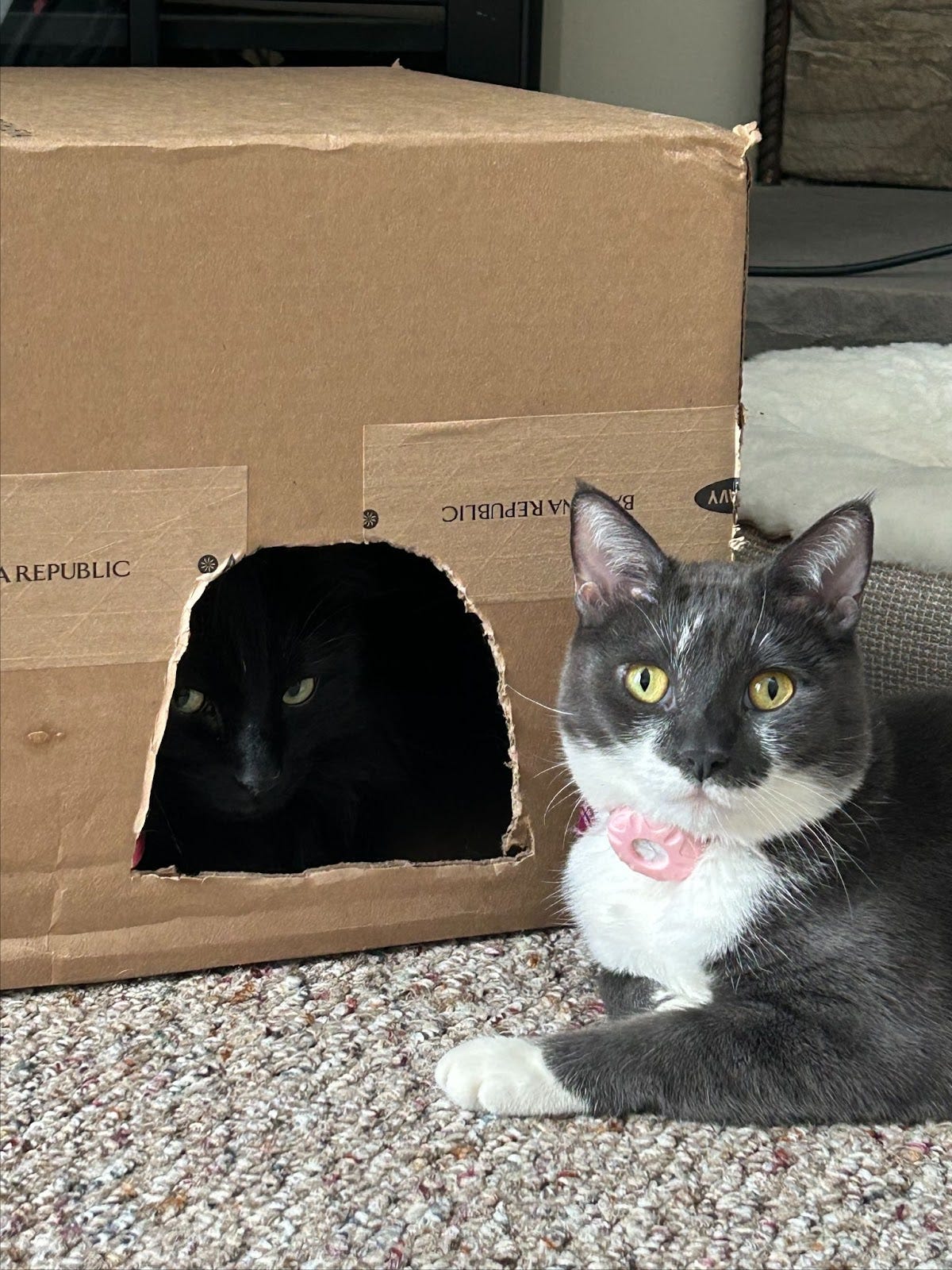How to give yourself the Gift of No
Plus some small gifts from me to you, and my annual Academia Made Easier Reader Survey!
Hello and welcome to Academia Made Easier. I am so glad that you are here.
It is the season in which holiday gift guides are ubiquitous. Gift guides for fashionists, politicos, and runners. For seniors, beer-lovers, and Taylor Swift fans. You name the group, there is a gift guide on the internet available to help you. Some gift guides are predictable, some are hilarious, and many include items that I end up buying, as coming up with gift ideas is hard and “gift-giving” is not one of my love languages. (I found my cats’ new beloved Cat Dancer toy through a gift guide this year!)
I lacked the organization or time management to write a gift guide this year (but trust me, that Cat Dancer toy would be on it!). But the current calendar year comes to a close and I am moments away from an extended period of wearing soft pants (this is a lie: I am already wearing soft pants), I have decided to share a gift idea with you. I think this might be a perfect gift for you to give to yourself. And it is available immediately.
It is, of course, the Gift of No. (My title/subject line kind of spoiled the surprise, didn’t it?) And if you (like me) spent a lot of the past month wrapping up stuff that your Past Self committed your then-Future Self to doing and think that you might need a bit more No in your life, today’s small thing to try immediately is for you.
One Small Thing to Try Immediately: Give yourself the Gift of No
We are all prone to agreeing to invitations that we should decline. It may be to things that we immediately know we want to decline, or things we suspect we want to decline but aren’t sure about, or things we think we should accept and then later learn that declining was the better option. We accept these invitations for many reasons (fear of missing out, inability to set boundaries, lack of clear priorities, inability to estimate workloads, bad habits), all of which are worthy of a discussion with a coach or therapist. But regardless of the cause, yeses that should have been nos are costly.
As time and energy are limited, every time we say yes to something we are saying no to something else. In the case of yeses that should have been nos, often the yes is to something that advances someone else’s interests and the no is to something that matters to us. The result is less time and energy for our own priorities and goals and, for me at least, a bit of a bad attitude.
The solution? The Gift of No.
In The Power of a Positive No, William Ury refers to providing others with a clear “No” as a gift. It is a gift to yourself because it gives you more time to devote to other things that matter more to you. It is also a gift to others: it gives them a definite answer and allows them to find someone else who is more interested in taking on the task.
As saying no is not always easy, particularly for women and others who have been socialized to be agreeable and likeable and similar such bullshit, I suggest that you deliberately give yourself the Gift of No in the form of a decision to say no in advance of receiving future invitations.
Try the following:
1. Identify your key Yeses. What do you want to say Yes to? What are your core goals that you are trying to protect time and energy for? Ury argues that an effective no is based on a yes – a yes to our core interests and desires. He provides some useful questions to consider:
“What am I seeking to create by saying No? What other activity am I wanting to say Yes to?”
“What am I seeking to protect by saying No? What core interest of mine is at risk if I say Yes?”
Write these down.
2. Calculate the opportunity costs of Yeses that should be Nos. Regret is a powerful motivator, so use it to your advantage. Think back over the past year (or another time frame.) With the perfect vision of hindsight, what requests or invitations did you say yes to that you can now see you could and should have said no to? (Hint: think through committees, reviews, trips, coauthorships, talks, writing commitments, guest lectures, evening events… Advanced level: look at your calendar from last year and identify these things on a week-by-week basis. This can be eye-opening!) Estimate how many hours you devoted to things that, looking back, you wish you had said no to.
The point here isn’t to beat yourself up for making poor choices. You may have thought saying yes was a good choice, or that [whatever it was] wouldn’t take as much time as it did, or that [other person/dataset/software/whatever] would be easier to work with. The trick here is to learn from experience. Knowing what you know now, are there any lessons that might help identify things to say no in the future?
Write these down.
3. Create your Gift of No. On a piece of paper, write down the following:
Between [date] and [date], I say Yes to [list your key priorities/goals]. To protect time and energy for this Yes, I will say No to [list things that are likely to come your way that might tempt you to say yes.]
For example: “Between December 23 and January 5, I say Yes to soft pants, time with family, and running with Sammie. To protect time and energy for this Yes, I will say no to responding to email, thinking about work, and pants with buttons.”
Post your Gift of No commitment somewhere where you will see it.
To be sure, there will be things you want to say no to that you don’t have the agency to decline or that would be unwise to decline. Few of us have the privilege of saying no to everything that doesn’t suit our interests or preferences. But where you do have the agency to do so, consider how you can give yourself the Gift of No so that you can say Yes to the things that matter to you.
Until next time…
Colleagues, I am so grateful for your readership and the ability to be a part of your life. I know that you likely get a lot of emails and I want to ensure that the Academia Made Easier newsletter is a welcome and useful addition to your inbox. To help inform next year’s content, can you please complete the 2024 Academia Made Easier Reader Survey? It is pretty short, all questions are optional, and your responses are highly appreciated. Of course, I just devoted multiple hundreds of words on the topic of saying no to things that you don’t want to do, but in this case, I am hoping you will say yes.
Stay well, my colleagues.
P.S. It is the holiday season and I have some gifts for you. The first is a photo of my sweet cats and their most recent box. Cat! In a box! Always a gift. The second is my Loleen 2024 Running playlist: 11.5 hours of semi-curated songs that I enjoyed running to this year. It is a bit odd but you might find a new song or two to add to your own playlist. And the third is a gentle reminder to be kind to yourself with any 2025 goals or New Year’s resolutions you might be setting. My EASY goals approach is a good place to start (see also “How to set EASY goals for 2023”, still relevant for 2025). Happy holidays!
If you find Academia Made Easier useful, please support my chocolate habit through my Buy me a coffee page. This site allows readers to show their appreciation for the unpaid labour of writers like me. 🍫🧁🙏
If you like the look of classically styled women’s clothing and the feel and functionality of athleisure, I strongly recommend SophieGrace, a Canadian company. Be sure to use my discount code AcademiaMadeEasier to get 20% off.
Have you got your copy of my new book, For the Public Good: Reimagining Arts Graduate Programs in Canadian Universities? If not, please order it now (and/or ask your university library to get a copy), be sure to sign up for the related Substack “Reimagining Graduate Education”, and note that my coauthors and I welcome invitations to work with units to implement the book’s ideas! Reviewer feedback of note:
“It is the kind of quietly good book we need to see more of. … This book provides a very solid description of the process of defining and developing excellent, sustainable arts programs that serve students rather than academics. And not only is it dead-on in terms of its recommendations about how to design and evaluate programs, it has a lot of helpful matrices and worksheets to help those who are put in positions requiring them to do exactly that … More like this, please." - Alex Usher
“Nearly half the book is dedicated to charting a transformative course for liberal arts departments.... If For the Public Good can provide the impetus for social sciences and humanities departments to refine their graduate studies programs, the career outcomes for tens of thousands of grad students will be the better for it. That alone would move the needle on Canada’s public good problem." - Literary Review of Canada





